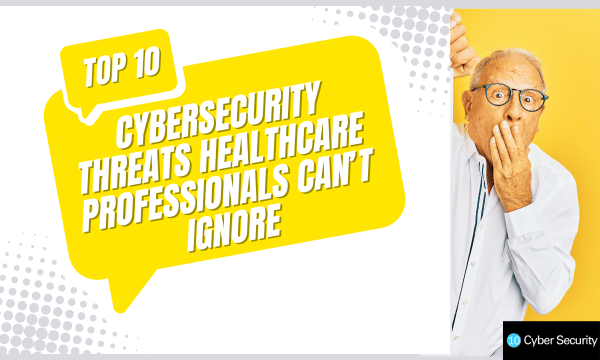
Healthcare professionals deal with vast amounts of sensitive patient data—medical records, billing details, prescription information, and even personal identifiers. With cybercriminals targeting the healthcare sector at an alarming rate, healthcare cybersecurity is no longer optional; it’s a necessity.
In 2023 alone, healthcare breaches exposed millions of patient records worldwide, leading to financial losses, regulatory fines, and damaged reputations. As cyber threats evolve, medical professionals must stay vigilant. Below are the top 10 cybersecurity threats healthcare professionals can’t afford to ignore—along with actionable steps to enhance medical data security.
1. Phishing Attacks: The Silent Data Stealer
Phishing remains one of the most common cyber threats in healthcare. Cybercriminals send fraudulent emails or messages, often impersonating legitimate organizations, to trick healthcare staff into clicking on malicious links or sharing login credentials.
How to Protect Patient Data:
- Train employees to recognize suspicious emails.
- Implement multi-factor authentication (MFA) for email accounts.
- Use email filtering software to block phishing attempts.
2. Ransomware: Holding Patient Data Hostage
Ransomware is a form of malware that encrypts patient records and demands a ransom for their release. A single attack can cripple an entire hospital, delaying patient care and causing financial losses.
How to Enhance Healthcare Cybersecurity:
- Regularly back up patient records in a secure, offsite location.
- Keep all software and security patches up to date.
- Educate staff about ransomware tactics and how to avoid them.
3. Weak Passwords and Credential Theft
Many healthcare professionals reuse passwords across multiple platforms, making it easy for hackers to steal credentials through brute force attacks or password leaks.
How to Improve Medical Data Security:
- Use strong, unique passwords for each account.
- Enable password managers to generate and store complex passwords.
- Implement multi-factor authentication for extra security.
4. Insider Threats: Employees as a Security Risk
Not all threats come from external hackers. Insider threats—whether malicious or accidental—pose a major cybersecurity risk in healthcare. An employee might steal patient records or unknowingly expose them through careless data handling.
How to Minimize Insider Threats:
- Restrict access to patient data based on role.
- Conduct background checks on employees.
- Monitor and log access to sensitive healthcare data.
5. Unsecured Medical Devices and IoT Risks
Modern hospitals rely on Internet of Things (IoT) devices such as smart pacemakers, insulin pumps, and connected monitoring systems. These devices often lack robust security measures, making them easy entry points for hackers.
How to Secure Medical Devices:
- Change default passwords on all medical devices.
- Regularly update device firmware and security patches.
- Segment IoT devices from the main hospital network.
6. Data Breaches from Third-Party Vendors
Healthcare providers often work with third-party vendors for billing, lab testing, and patient record management. If these vendors lack strong cybersecurity, they can become weak links in your security chain.
How to Secure Third-Party Access:
- Conduct security assessments before partnering with vendors.
- Require vendors to comply with HIPAA and other healthcare regulations.
- Limit third-party access to only necessary data.
7. Outdated Software and Unpatched Systems
Many hospitals and clinics still use legacy systems that lack modern security features. Outdated software is a prime target for cybercriminals exploiting known vulnerabilities.
How to Strengthen Healthcare Cybersecurity:
- Apply software patches and updates regularly.
- Replace legacy systems with modern, secure solutions.
- Use endpoint security tools to detect vulnerabilities.
8. Lack of Cybersecurity Training Among Healthcare Staff
Many data breaches occur due to human error, such as staff clicking on malicious links, using weak passwords, or mishandling patient data.
How to Educate Healthcare Professionals:
- Conduct regular cyber awareness training for all employees.
- Simulate phishing attacks to test employee awareness.
- Establish clear cybersecurity policies and protocols.
9. Public Wi-Fi and Remote Work Risks
With the rise of telemedicine and remote work, healthcare professionals often access patient records from unsecured public Wi-Fi networks, making them vulnerable to cyberattacks.
How to Secure Remote Access:
- Use a Virtual Private Network (VPN) for secure remote connections.
- Restrict access to patient data from personal devices.
- Enable encryption on all devices handling patient records.
10. Compliance Violations and Regulatory Risks
Failure to comply with healthcare cybersecurity regulations can lead to hefty fines and legal action. Regulations like HIPAA (USA), GDPR (Europe), and the Australian Privacy Act mandate strict security standards for patient data protection.
How to Ensure Compliance:
- Conduct regular compliance audits to assess vulnerabilities.
- Encrypt patient records both in transit and at rest.
- Appoint a Data Protection Officer (DPO) to oversee compliance.
Conclusion: Strengthening Your Cyber Defenses
Cybercriminals see healthcare data as a goldmine, making hospitals, clinics, and medical professionals prime targets. Protecting patient data isn’t just about avoiding financial losses—it’s about ensuring patient trust and safety.
Take Action Now
- Train your staff with cybersecurity awareness programs
- Implement strong authentication methods for all accounts
- Regularly update and patch all software and medical devices
- Monitor third-party vendor security practices
- Encrypt patient data and use secure cloud storage solutions
Protect Your Practice Today!
Don’t wait for a cyberattack to expose your weaknesses. Strengthen your healthcare cybersecurity today with BCyber’s specialized training and security solutions.
Contact us now to schedule a cybersecurity assessment and ensure your medical data security remains ironclad.
